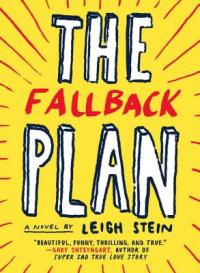The Fallback Plan by Leigh Stein
 Monday, January 2, 2012 at 2:43AM
Monday, January 2, 2012 at 2:43AM 
Published by Melville House on January 3, 2012
As a theater major who took the role of Blanche DuBois a bit too seriously (becoming something of a depressed lush in order to better inhabit Blanche), Esther was destined for unemployment. Jobless despite her freshly tendered degree and lacking a fallback plan, Esther moves back home with her parents, where she hopes to contract an incurable but painless disease that will let her collect disability checks while spending her days in bed rereading her childhood books. Instead she begins babysitting for a couple named Amy and Nate who have suffered the loss of their other child. When she's not working or hanging out with friends, Esther halfheartedly constructs a script for a movie about The Littlest Panda. She fantasizes about a bad boy named Jack but Jack already has a girlfriend, a situation that does nothing to alleviate her ongoing depression. Will Esther manage to get her life together, to find the purpose that is eluding her? That's the question that animates The Fallback Plan, a short and very funny first novel.
Parts of The Fallback Plan are familiar -- the inexplicable attraction women often feel toward men who are jerks, Esther's crush on the father of the child she babysits, the insecurity that comes from being young and aimless -- but Leigh Stein manages to give old themes a fresh spin. Other aspects of the novel, including The Littlest Panda's recruitment to save Hanukkah and Amy's artistic attempt to cope with the loss of her child, showcase Stein's creativity.
Stein has a freewheeling sense of humor that should appeal to most readers. It's alternately subtle and goofy, occasionally provocative, and always amusing. Yet underlying the comedy are serious themes. Amy and Nate are burdened with guilt and loss. Esther isn't as tragic as Blanche DuBois but she clearly has issues of her own. She wonders whether the turning point that so often characterizes fiction -- the point where "the hero has to step up and risk it all" -- is illusory, whether she will still be clumsy and depressed in middle age, only more so. Working through the screenplay is a way of working through some of her issues -- a smart device that makes the panda's story shed light on Esther's life.
Stein avoids easy answers and simplistic platitudes. Esther gains some insight from her relationship with Amy and Nate -- if only the knowledge that no matter how troubling one's problems might seem, there are always people who live more painful lives -- but happy endings are the stuff of movies (The Littlest Panda included). Still, the novel's ending is far from unhappy; there are lessons learned, progress made.
Stein's writing style is well suited to comedy. Her prose is clever but unobtrusive, never getting in the way of the fun. There is enough depth to the story to give it substance but Stein deftly balances seriousness and humor; she keeps the tone light and avoids the beginning's novelist's tendency to lose focus by chasing a profound message.
RECOMMENDED
Reader Comments